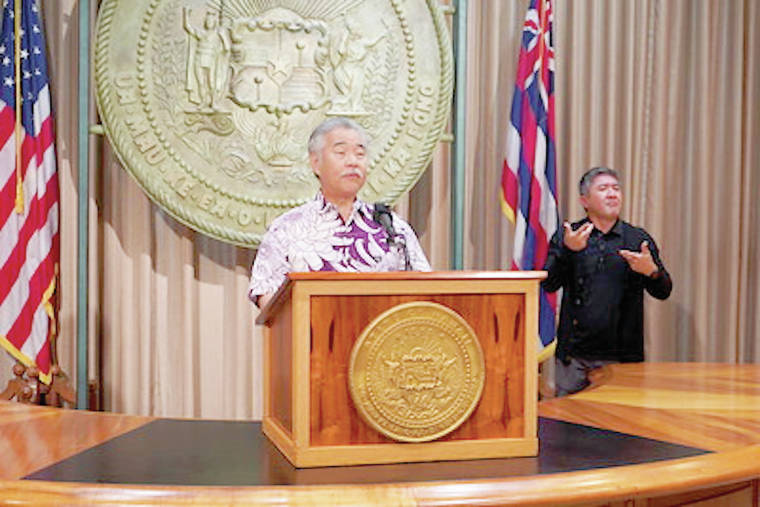HONOLULU — Gov. David Ige has informed state leaders and lawmakers on his intent to veto 28 bills out of the 260 passed during the 2021 legislative session, including one that would pay bonuses to teachers.
“Several key considerations went into my decision-making,” Ige said during a press conference Monday.
“First, the state’s economic position has significantly brightened since the beginning of the legislative session and, most definitely, since the Legislature concluded its work. This is a direct result of substantial federal funding that we have received to address the range of pandemic-related costs.”
One bill to be vetoed by the governor is House Bill 613, which seeks to appropriate federal funds from the Coronavirus Response and Relief Supplemental Appropriation and the American Rescue Plan Act for the purposes of conducting various education-related services including bonuses to teachers.
“The Board of Education and the Department of Education did seek input from stakeholders,” Ige said. “Certainly, there was a focus on learning loss. Part of that was to ensure that this past summer, we had the most comprehensive summer school program ever. We had more schools welcoming students during the summer because of the learning loss that occurred.”
Hawaii State Teachers Association’s President Corey Rosenlee disagrees with Ige, and hopes he changes his mind.
“All across the country, many states and school districts have given these teacher-stabilization payments to educators using federal-stimulus money to retain teachers after a very stressful year and a half during the pandemic,” Rosenlee said. “We hope Gov. David Ige will honor the bill that unanimously passed both houses of the Hawai‘i Legislature. And if the governor chooses to veto HB613, we hope that lawmakers override his veto.”
Ige pointed to federal funds and the high number of visitors coming to Hawai‘i as reasons for a brighter economic forecast.
“This is a significant difference from when the Legislature made the tough decisions to manage the state budget and then arrive at a spending plan,” Ige said. “Because of this, we definitely no longer need some of the extraordinary revenue measures that have been proposed.”
The Coronavirus Response and Relief Supplemental Appropriations Act of 2020 and the American Rescue Plan Act of 2021 provide substantial federal funding to address a range of pandemic-related state costs. These include nearly $600 million for the DOE and $1.64 billion of general-purpose funding to mitigate state revenue losses and increased COVID-related expenses.
The Council on Revenues also increased its general-fund revenue projections for fiscal years 2021 through 2027 by a total of $6.1 billion over the seven-year period.
“House members will meet this week to discuss the governor’s intended veto list,” said Scott Saiki, state House speaker. “The governor has not made his rationale for vetoes clear in his written notice. We hope that he will provide further rationale in the next few days. At that time, we will decide whether to override any vetoes.”
According to the state Constitution, the Legislature may convene before noon on Tuesday, July 6, for the sole purpose of acting upon any such bill returned. Then, any measure passed during the 2021 legislative session that has not been signed or vetoed by Ige will become law with or without his signature.
The other four educational bills on the veto list include Senate Bill 811, a bill that requires the DOE to publish a weekly report on any student, staff member or affiliated individuals who have tested positive for COVID-19.
HB515 requires the state auditor to conduct a survey of the school food-services branch to identify the amount of local produce being purchased and served in school cafeterias. HB15 amends the current statute governing the BOE’s ability to appoint the DOE superintendent.
The fourth education bill, HB546, requires complex-area superintendents to report directly to the DOE superintendent, and requires the DOE offices of information technology and strategy, innovation and performance to submit reports to the Legislature on how they intend to restructure their respective offices.
Finally, SB807 requires the academic plan for each school to include new measurements, including an accounting of resources used to achieve each measurable outcome, a breakdown of costs and funding sources, as well as full- and part-time positions used to achieve each outcome.
In addition, SB807 also requires the DOE to include student growth indications such as the National Assessment of Education, conditions that impact learning, a breakdown of teacher vacancy data, special education and other items.
Final decisions about vetoes will be made in the coming weeks.
For the full list of bills Ige intends to veto, and his rationales, see https://tgilinks.com/35Hf3H5
•••
Stephanie Shinno, education reporter, can be reached at 245-0424 or sshinno@thegardenisland.com.






Signing more bills or veto? What does this mean? Delta variant is dangerous. The pandemic could last well into 2022. Canceling UH football and HHSAA football is certainly in talking terms. Possible. This has no bearing on my well being. Politics from my perspective.
And I don’t know any Kolten Wong. I don’t know what he was. And I am a Pakistani living in Hawai’i.